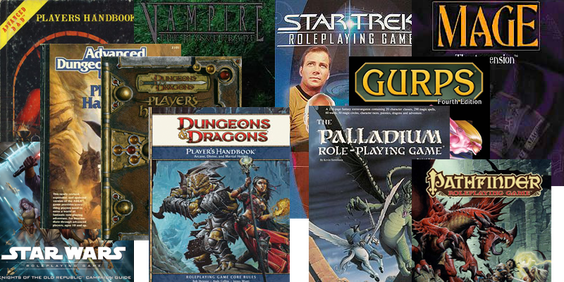 "So what do you do to unwind?" "I play role-playing games." "Silence" How many times has this dialogue been uttered between a gamer and a...non gamer? Muggle? Whatever you want to call him/her. In my day-to-day life, this conversation has happened an average of 2.48 times a week. And what do I do then? How do I bring people into the Dark/Light side (however you want to look at it)? I take a deep breath and…. Explain.... 1. What is it? RPGs (Role Playing Games) are board games without a board. They are games with rules, obviously, but without borders, markers or limits. Another way I describe it is, it’s like a computer game, but there’s a person running it, so there’s no limitations imposed by a programmer. Within the limits of the world (as designed by the person running it), the sky is the limit. Or Deep Space. Or the ocean’s depths. Or wherever it’s being run. 2. How does it work? The person running it (from here on called the GM – Game Master) presents a situation, paints a picture, describes a scene. And sits there. The other players have characters, which are present in that scene. They will then describe what they want said characters to do. Depending on the complexity of the instructions, it could be trivial like walking around a room, or complex like jumping through a wall and punching the baddie so hard, one of his teeth shoots out and smashes an elder idol, revealing the missing key to the temple. You know, improbable. Depending on the difficulty of the action, the GM might want you to roll a dice. Which inevitably leads us to question 3. 3. Do I have to do loads of maths? In a word, no. In a long word, noooooooooooo. The GM might ask the players to roll dice at different times during a game, to simulate the randomness of real life. Sometimes you shoot a whole clip and miss, and you throw a pebble and hit. The maths are simple, add two numbers, at most subtract a third. That’s usually it. 4. How long does it take? This depends wildly, but it normally takes a bit for the game to settle and take off. You do need to be patient, especially in the first couple of games, when the rules of the world and the interactions between the characters are being established. So to answer the question, an average session can take anything from Two to five hours. Three or four would be normal. Any shorter and the characters would still be putting their socks on. Two day binges over a weekend are not unheard of but unusual. 5. How do you win it? You have fun. There is rarely an end point as well defined as that. There might be a boss fight at the end, but a crafty GM might have it escape at the end, keeping it as a recurring baddie. This is quite hard to explain to non-RPG Gamers, as there are usually no win-game parameters. It’s about the story. In the best zen way possible, RPGs are about the journey. 6. Kill, kill, kill, see if anyone’s alive, ask questions. For people raised amongst consoles and gaming PCs it might be hard to wrap their heads around a non-shooting-and-killing-everything-that-moves-and-most-of-what-doesn’t game. Now most RPGs have encounters, where the players…. Encounter things. (Hence the name). These might be traps, beings, environmental issues; the list is pretty much endless. And the dice come out again. You need to simulate the weirdness and randomness of the real world once again. This is where RPGs really shine forth, as the die, those blasted polyhedra, might make things go south FAST. A good GM might not kill the party outright, she might just make things grimmer and grimmer. And the players will have a blast trying to get out. Maybe getting out with a blast…. That’s actually not a bad idea at all….. 7. When do you know it ends? Usually, in an ordinary game, the game "ends" or rather "pauses" when someone needs to leave. This will hopefully happen on a natural pause, a lull in the narrative when nothing is presently happening (nothing too good or too bad is happening, say, empty room, forest clearing, empty alleyway). Overall (see point 5), the point is not to win, and therefore, in a very odd way, there might not be an end, a proficient GM (or combination of more than one, taking turns) might keep a campaign going for ages. Months, easily. Years are not unheard of. Again, it’s about the journey, and not necessarily the end. Role-playing games are about friends, and dice, and games, and fun, and horror, and suspense, and funny voices, and fantastic times. It’s theatre with gaming stuck in, but you don’t have to good at it, or learn lines, or anything like that. You just need to have fun. Lots and lots of fun. Rui is a Portuguese scientist who, after a decade doing odd things in labs, became a teacher. Then, 18 months ago, RPG’ing came into his life and he is now happily juggling the two. He is currently working on a Cypher system space/superhero adventure and a Fate-based Cyberpunk one (with a dark, secret twist). He lives in England with his partner Joana, an ungodly number of potted plants and at least 3 to 4 Adventures across as many rule systems, at different levels of completion. He can be reached at @atomic_rpg Leave a Reply. |
All blog materials created and developed by the staff here at High Level Games Archives
April 2023
Categories
All
|
Proudly powered by Weebly



 RSS Feed
RSS Feed